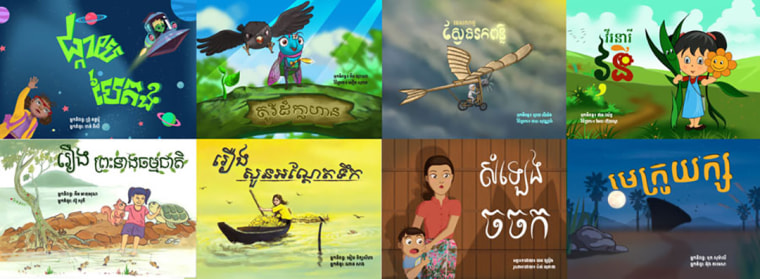In “The Wolf’s Sound,” a young Cambodian girl practices howling like a wolf for a school reading competition just to be told that only boys are allowed to make animal noises.
She decides to persevere, eventually winning the competition and dreaming of becoming an author when she gets older.
“Smart and courageous female characters can serve as role models for young girls in Cambodia during their formative years and help build their confidence to pursue fields of their own choosing as well as leadership roles.”
That story is one of several children’s e-books released by The Asia Foundation in the Khmer language last month highlighting female empowerment. The books are part of the group’s Let’s Read! initiative, which makes books available for children to read anytime, anywhere in languages they use at home and school.
The initiative is meant to showcase the importance of mother tongues, Melody Zavala, director of the Books for Asia program at the The Asia Foundation, told NBC News.
“Asia is home to over two thousand minority languages whose speakers are among the region’s most marginalized populations,” Zavala said. “It is now widely understood that mother tongue-based education, in which students begin in the same language that is spoken in their home and community before transitioning to a more widely used national language, is the key to unlocking literacy and improving educational outcomes and economic opportunities. In short, children learn first and best in their mother tongue.”
But, she added, mother tongue books don’t exist in many communities. This can result in low levels of learning and motivation, which contributes to school dropout rates, Zavala said.
Both boys and girls also benefit from stories that show that girls are equally capable, Zavala said. A 2013 report from The Asia Foundation found that while women represent 51 percent of Cambodia’s population, their lives are constrained when it comes to social, political, and economic indicators.
“Conservative traditional norms value women less than men, and persistent gender power imbalances lead to poverty, illiteracy, gender discrimination, and other obstacles that prevent women from effectively participating in Cambodia’s development,” Zavala said.
She noted that families typically prioritize boys’ education over girls’, and men dominate all branches and levels of government.
“Many female politicians face marginalization and limits on their effective participation,” she said. “Women in Cambodia are important economic actors, often responsible for the production and marketing of products but, of course, like every other country, missing out on the talents and contributions of a significant portion of the population across all sectors constrains national development.”
To help address that issue, the books feature female protagonists.
In “The Brave Tory,” a female cicada is told that she cannot compete in a flying competition because she cannot fly as fast as male cicadas. She persists, eventually winning.
And in “Green Star,” a young girl named Nita uses her knowledge of science to help a green alien boy return home.
“We can see the parallel in political and social spheres where women are often discouraged from participating.” Zavala said. “Smart and courageous female characters can serve as role models for young girls in Cambodia during their formative years and help build their confidence to pursue fields of their own choosing as well as leadership roles.”
Writers, editors, illustrators, designers, and book directors came together to create the books during "hackathons" — collaborations that took place over a day or two — to help shorten the production time from six to 12 months to two to four months, according to Zavala.
Socheata Pors, a freelance illustrator and designer, decided to take part in one of the hackathons. Pors, who illustrated “The Wolf’s Sound,” drew from the morning to night, an exhausting endeavor, she told NBC News, but one that she enjoyed.
She said that since the e-books are free, it's a great chance for kids who cannot afford to buy books to enjoy reading too.
“Young girls need role models to look up to,” Pors said. “In rural Cambodia, there are not many role models for them to learn from other than female teachers. Through books, we can enrich their imagination by showing them what girls are capable of.”
Follow NBC Asian America on Facebook, Twitter, Instagram and Tumblr.
